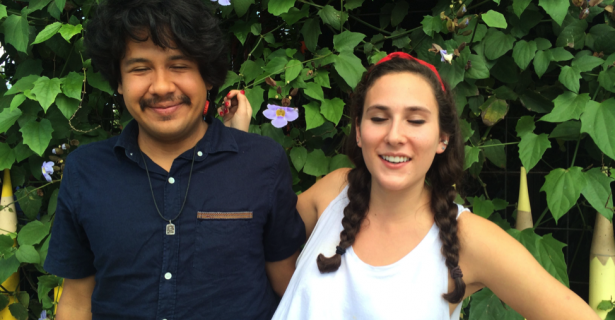This is me with my research assistant Gabe, standing in front of the flowered fence outside the El Molino café in Managua. When this picture was taken, I was four hours in to the eventual ten hours I would spend that day in the café behind the flowered fence. El Molino is located inside a bookstore, Hispamer and has the benefit of having internet, air conditioning, and a tolerance for long-stay customers. Although I have been in Managua for just three days, the staff has become accustomed to my constant presence. I come in at 9 am, sit at my usual table, my favorite waiter Ricardo greets me warmly: “Buenos dias, Señorita Rebecca” as he puts down my café con leche.
I have become an intriguing phenomenon here, although not as an American. In fact, there are many Americans and Europeans here in this part of Managua. Spanish, English, Portuguese, Chinese and other languages I couldn’t identify swarm together to create that crowd white noise which luckily does not interfere with my recordings. Rather than my blue eyes which normally make me stick out like a sore thumb in Managua, it is my little make-shirt paper sign which reads “Rebecca: Interviews” and the constant stream of young people passing in and out of the extra chair by my table. On multiple occasions, strangers from around the world have approached me asking me about what exactly I was doing and why.
Pictured with me in the pre-delirious image is my wonderful research assistant Gabriel Perez Setright. A Nicaraguan-American recent graduate from Warren Wilson College in North Carolina. Gabe was largely responsibly for outreach and scheduling the interviews I conducted inside the café, but he also helped me guide me through what I knew would be the hardest aspect of this research for me: chaos.
I am the kind of student who likes plans: I obsess over my syllabi, marking in my schedule the most trivial details: when I will do laundry, when where and with whom I will eat my meals, etc. This investigation was no different: I had a very specific advertising plans, an exact sampling I wanted for my participants, and the perfect semi-private locations and the ideal timing for these interviews. But I also came into this investigation knowing deep down that Managua would never let me get away with my perfect plans.
Gabe helped me manage the unavoidable challenges to my perfect plans. My IRB approval came in too late and we couldn’t do effective advertising for university student subjects on campuses, which are now closed for winter break. We had to take any participants we could get, regardless of whether they help fulfill my ideal distribution. Instead of my quiet interview spaces I ended up holding my interviews here: in a café on the other side of the city from my hotel. Many recruited subjects did not show up, came at the wrong time, or couldn’t find me in the crowd of coffee-drinking Europeans at the cafe.
But Gabe helped me find the silver lining of this disorientation and disorganization. The café ended up being a much easier and less expensive place to host interviews. In desperate Facebook posts in search of last-minute participants I spoke with some of the most interesting students. In my unanticipated free time, I managed to get access to old Sandinista textbooks from 1980, an incredible resource for my thesis that I had assumed I would not be able to get my hands on. As I finish up my research in Managua, I am trying to embrace the chaos of unplanned changes as a sort of serendipity that will improve my work in unanticipated ways.

